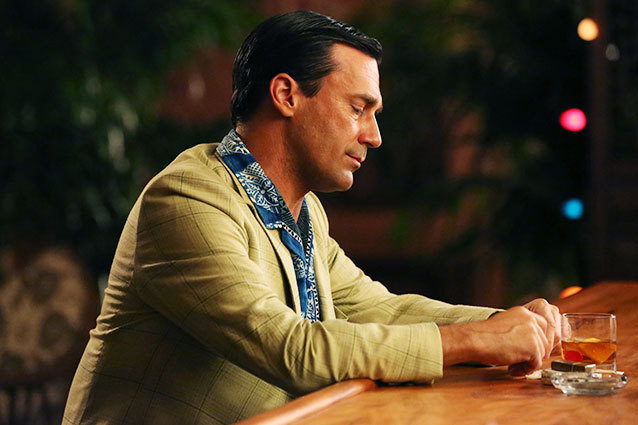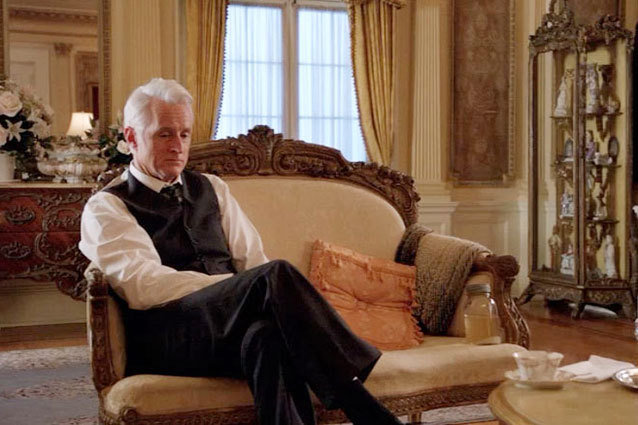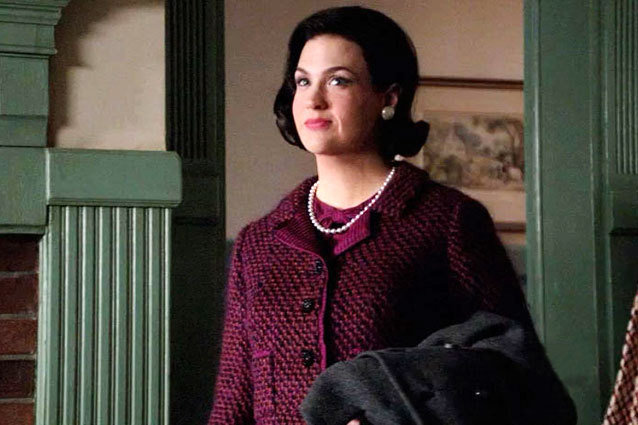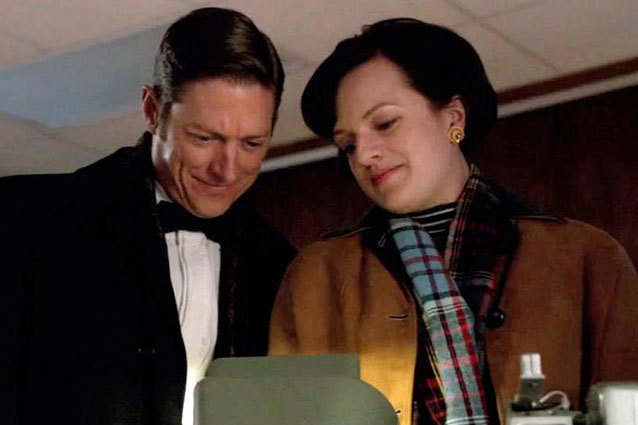
The Season 6 premiere of Mad Men starts with a nasty trick. The episode begins through the perspective of a man lying on the ground, looking up at the ceiling while someone beats on his chest. In the background you hear Megan, Don Draper’s wife, screaming. We’re so used to seeing this world through Don’s perspective we think, “Oh, Don Draper had a heart attack.” Immediately it flashes back to him and Megan on the beach in Hawaii and you think, “Oh, we’re going to find out how Don ended up having a heart attack.” But later in the episode we learn, well, it wasn’t Don at all, it was his doorman, who he, Megan, and their cardiologist neighbor watched have the cardiac arrest. What a dirty, stinking trick.
It feels like a bait and switch: we’re supposed to think that Don is in danger of dying when he’s not in danger at all. But it isn’t a trick. It is Don’s perspective. In fact the whole episode, like so many in Mad Men history, is staring toward death — with Don gazing in that direction not only because of the ill doorman but also because he is, once again, searching for identity.
Last season we saw Don struggling against his natural impulses. After marrying Megan and chasing his happiness, he came clean with her about who he is and his dark past. He was trying to integrate Dick Whitman and Don Draper and become one fully-formed healthy individual. By the end of the season, when he walks away from Megan and was eyeing that other woman in a bar, he had clearly failed. This season seems like it is going to be about his relapse, about the cost of his failure or, even worse, his sinking into irrelevance.
This episode, however, was all about artifacts. We see each of the four major characters we follow in the premiere – Don, Roger, Betty, and Peggy – each dealing with their identity, who they are and what the world thinks of them, and what objects from other people, dead or alive, have left them.
Like Greg Brady with the bad luck Tiki god, Don Draper finds his artifact in Hawaii. The first sequence of the show is very odd, showing Don and Megan in paradise and he’s enjoying himself, but totally silent, conspicuously so. It’s like he can’t speak when he isn’t being his authentic self, when he’s playing the role he thinks he’s supposed to. This is the same Don Draper who left his daughter’s birthday party to go sit and drink alone in his car.
RELATED: ‘Mad Men’ Goes to Hawaii for Season 6
The first time he speaks is to tell the soldier at the bar that he was in Korea, and to speak honestly about himself. When the drunk grunt asks Don to walk his soon-to-be wife down the aisle at his wedding, Don says, “You don’t know me. One day you’ll regret it.” But the soldier says that one day he will be just like Don, a “veteran who can’t sleep and talks to strangers.” Though Don didn’t start the conversation, what is his job other than “talking to strangers.” Don puts aside his existential declaration that no one knows him (there is a lot of everyone not knowing anyone in this episode) and officiates his wedding, another moment of what seems like real joy, a moment of true love, even though Don rails later that the word is being overused and spent of its meaning.
Later, when he’s back in his Manhattan apartment, when the slide of the ceremony comes up he can’t talk about it to everyone else in the room. He is once again back to being inauthentic. (And, of course, notice the difference between Don’s presentation with the carousel in this episode and his presentation with the carousel in Season 1.) Originally he was powerful and persuasive and using his own experience to win over the clients. Now he’s entirely silent and no one wants to buy his experience.
Don’s artifact, of course, is PFC Dinkins’ lighter, which he and Don mistakenly switched at the bar. This time he has taken on another soldier’s identity by accident, unlike the first time when Dick Whitman stole Don Draper’s identity on purpose to achieve the American dream he always thought he was promised. Don thinks about taking on the soldier’s identity, a soldier who is violent, impetuous, and stupid, all things that Don is not. He throws the lighter away, rejecting this new identity, but Megan brings it back to him. She proves that Don can’t be his true self with her, she wants him to maintain an alter ego, whether it’s Don Draper or this new PFC Dinkins, a man who gets sloppy drunk and asks inappropriate questions of strangers. Megan doesn’t want the real thing, she wants a fake. Don eventually gives the lighter to his secretary and says to send it back, without a note. He wants to distance himself as far from this man as he can, no matter the joy he might have brought him on the beach. For Don it’s more important to be honest and grow into himself again than take someone else’s identity.
Don is also struggling with the inscription on the lighter. “In life we often have to do things that aren’t our bag.” Don’s initial life with Betty were all things that weren’t his bag – having the wife and kids and settling down in the suburbs. He rejected that motto to find happiness with Megan in the city and that wasn’t his bag either. Don seems to have internalized this motto, but rails against it, selfishingly doing the things that are right for him even if they harm other people.
It seems like things at work aren’t Don’s bag these days anyway. He hates that the photographers are there to take everyone’s pictures and they rearranged his office. He hates that he has to, once again, put on a facade for the public. The photographer tells Don to just be himself, but he can’t. He no longer has any idea what his self is. He stands in his rearranged office thinking back on the waves of Hawaii as the snow falls, and you can’t help but think of that falling man in the opening.
Later when presenting to the clients he gives them a presentation about a man who goes to Hawaii and is transformed, he just disappears into paradise (which seems to be Don’s new fantasy about how to gain happiness). The client ask Don where the man went. “He jumped off,” Don replies, once again recalling that falling man from the opening credits. Everyone thinks the guy killed himself, something Don didn’t even realize he was telegraphing, something he might not have even considered as an option, until now. Is Don destined to be the one who falls off the top of the building, like people have always thought he is?
Things at the office aren’t going well. Not only is there the strange interloper Bob Benson (who seems to be serving some dark force with a smile on his face), but Don no longer holds his sway with the clients. When they don’t like his presentation, he gets forceful, explaining himself frantically, using his old penchant for getting aggressive to get results. But this time it doesn’t work. He caves and tries to give them what they want; anything to prove he still has it, he’s still a genius. Even that doesn’t work. He has failed, and not only has he failed with his vision, he even failed with a compromised version of it. Don is struggling with everything, not only his sense of self, but his creative vision.
Don Draper, being Don Draper, is also having trouble at home. How do we know? Well, he doesn’t care much about Megan or what she does or what she has to say. She’s off having authentic experiences (working as an actress, going hunting for weed in Hawaii) while he’s moping around with his white people problems wondering about what is going to happen to himself after he dies. Boo-hoo.
He’s also sleeping with his neighbor’s wife. We first meet Dr. Rosen in Don’s elevator and it appears like they have a loose friendship. There’s something about Rosen’s skill as a doctor that intrigues Don, that he has somehow mastered death. It’s like he has a real gift, a real profession, not just serving corporate shills by captivating the public’s desires. Of course Rosen wants to be Don, a good-looking, confident man who can get anyone to do what he wants using the power of his persuasion. They both think the other has it all. Don offers the man a camera and, more importantly, his friendship, but the shock is that Don is sleeping with his wife all along.
Like always, Don’s dalliances aren’t about sex, they’re about escape. They’re about bucking against the norm and hoping that the feeling he creates through sex will somehow allieviate his anxiety about life. (Rosen even says, “People will do anything to alleviate their anxiety.”) Yes, Don isn’t sleeping with Rosen’s wife because she’s attractive (which she is) or he’s in love with her, she has been reducted to an object of her own, another artifact. He’s sleeping with her so that he can try to steal some of Rosen’s magic and possibly inject it into his own life. He’s fighting against being himself by trying consume another man’s life yet again.
It’s not working. He tells his new playmate, “I don’t want to do this anymore,” but he doesn’t mean sleep with her, he doesn’t even mean cheat on his wife in general, he means he doesn’t want to have to deal with yet another existential crisis. He just wants an answer, he just wants any answer. Sadly, he’s not going to find it from any of the other characters.

Roger’s story, of course, is about death. Duh. It contains two dead people, him sitting in analysis mockingly pleading for his doctor to explain it all, and he’s fretting that he thinks that life is just a meaningless series of experiences, doorways that are boring to open. Roger, like Don, has also fallen off the path to enlightenment. Last season he took LSD, divorced his wife, and was looking toward the future to try to find something worthwhile (Season 5 ended with us staring at his bare ass as he embraced the world). Either he’s off that path or not finding it has put him right back where he was in the first place.
He’s chasing after another comely brunette (who we don’t get the pleasure to see) and pining after Joan. Maybe she’s what will make him happy? It would have made the rest of us happy if we had seen a little bit more of her in the episode.
Anyway, Roger has two reilcs. The first is the water from the Jordan River his father brought back for his mother that was used to baptize almost everyone in the family. While freaking out at his mother’s funeral (I would too if someone had barfed in the umbrella stand, but his outburst seemed a little over-blown), Roger makes the ultimate Freudian slip and says it’s “my funeral.” His ex-wife Mona comes upstairs and suggest maybe he would be more happy if he connected to the people who already love him rather than chasing after another one.
10 Things You Should Know About the ‘Mad Men’ Premiere
That’s when he goes downstairs to talk to Margaret. He brings up the family and presents her with this artifact, but all she wants her grandmother to leave her is money. Roger wants to talk about love and she only wants to talk about commerce. Already the water is losing its potency, Margaret didn’t use it to baptize her son and, after her conversation about refrigerated trucks (not a bad investment at all!) she leaves it behind on the couch. She doesn’t want a bit of the past, she doesn’t want a bit of Roger, all that she wants is money and the future it can buy her.
Later Roger is looking for a shoe shine but his shoe shine man has died. His daughter sends along his shoe shine kit to Roger who takes it into his office and finally cries after feeling nothing about the death of his mother or Mona having found a new man in her life. This is what makes him cry. A shoe shine kit. Sometimes it feels good to let it all out, even if it’s over some chemical soaked box.
The important thing about the artifacts in the episode is that they aren’t good as objects, only instruments that people are willing to use. If, like the water and the shoe shine kit, they’re not being used by someone then they’re just so much junk, but, like Sandy’s violin, when they’re being used, they’re the things that connect us all to each other.
Now Roger doesn’t have any connection to anyone and it’s starting to wear on him. He mentions being shipped out of Pearl Harbor (it’s startling how three men in the premiere are all defined by their wars) but his cohort and his mother are dying off. Even the old ways are dying off. There’s no one to know how to use a shoe shine kit and Roger is completely obsolete, left with nothing but some worthless junk, a bunch of stories no one wants to hear, and a room of women he’s disappointed. He doesn’t need analysis, he just needs something better to do.

As I said before, Betty’s artifact is Sandy’s violin, at least initially. Her relationship with Sandy is interesting in that everything that Betty says is defeated by her actions. Oh, our Betty, still a little bit fat (but she’s “reducing!”) and completely out of touch with herself. She is constantly defending her choice to stay at home and be the pretty wife and mother of increasingly ungrateful children, but that’s what she never wanted at all and she has always fought against it. It’s as if it’s easier to propogate a myth than actually change.
That’s why she’s trying to find Sandy and why she holds onto Sandy’s violin, since it is a symbol for the dream Sandy has for a better future. Anyway, Sandy says she wants to take off to New York and live an exciting life and Betty says that her life as a model in the Big Apple wasn’t all that and she should wait until she’s ready Later, when the hooligans at the St. Mark’s flop house tell her that they “hate [her] life as much as [she] does,” she fights against them. She tells that they are awful and she storms out, ripping her coat. Even being there she is changed, the fabric of her existence very literally sullied by her being in the tenement. (Anyway, they didn’t hate her “goulash” all that much though.)
RELATED: What Is This ‘Mad Men’ Season 6 Party All About Anyway?
But she leaves the violin there. Sandy is already a lost cause and Betty knows it. During her kitchen scene with Betty (which is about as touching as ice cold Betty ever gets) Sandy says, “It’s amazing how quickly some people come up with lies.” We all know that applies to Betty, but it applies to Sandy as well, who lied about Julliard and where she was going. She is going to turn out to be just like Betty, another girl disappointed by her options in life, someone who will defend her choices even as they make her miserable.
There is also something about Betty that wants to destroy Sandy. The younger generation is making the older characters increasingly nervous, but Betty seems to be the only one to wish harm on the younger children, when she makes that really inappropriate joke about Henry going to rape Sandy while she holds her down. That’s the only thing that I can think of to explain her shockingly inappropriate comments, delivered with a smirk so small they seem to be entirely serious.
In the end though, Betty’s real artifact is her hair. Like Don and Roger, this is something she is doing to try to be more authentic. This is, of course, a direct reaction to the hooligan calling her hair “bottled” when he reads her real color is brunette on her driver’s license. She doesn’t want to hide anymore. She wants to be the real Betty who may be a bit chunky and have brown hair, not the perfect Barbie doll everyone told her she had to be for Don (and look at how well that turned out anyway). Ironically, her new hair color is just as manufactured. She didn’t let her roots grow out, she is just trying to cover up the new facade with the old one. Of course the kids hate it. The kids will always hate everything their parents do, especially when, like Bobby, he is faced with the reality behind the illusion that his mother has always sold to him. She is now “ugly,” and he sees it for the first time.

Peggy, of course, is the exception that proves the rule. If we are looking at Don and how far he has fallen since the first episode, look at how much Peggy has risen. Her artifact is the lost footage that she found and, unlike everyone else, she can interact with that footage and use it to make beautiful music, as it were. She can shape it into something that is great, and that is what makes her different from the other three. This is Peggy’s moment like Don’s with the slide projector all those years ago. She is finally, truly ascendant.
And while she’s is using strategies and tools that she learned from Don, she has also found her own strategies. Last season, when she went all Don Draper on the Heinz baked beans people and tried to force them to take her idea, she was shot down. Now, when the earphone people don’t like her solutions to alter their aborted Super Bowl ad, she finds a way to get them to agree to let her do her job by being nice and courteous. While everyone still considers her part of a “frat,” she has found a way to be both a woman and an executive at the same time, using a more subtle tactic that would have made a man look weak.
No, Peggy isn’t far away from Don at all and she stays up late at night with Stan on the phone, still in close contact, letting him listen in on her big triumph. It’s as if it doesn’t really happen for her unless there is a way for it to get back to Don. And as much as she wasn’t like Don with the client, she was just like him with her staff: stern and demanding but, at the end, giving them her sandwich and showing a bit of care. It was a classic Don Draper move.
But still, she isn’t entirely confident with the power. Later, Ted, Peggy’s boss, tells her that she has to tell the rest of her employees to go home. “They’re not waiting for me?” she asks incredulously. Why would all these people be paying attention to her, trying to prove to her that she’s a good worker when that’s still all she wants is someone else’s approval: Don’s.
Peggy, unlike all these other people, is actually happy. Her sense of self-worth comes from her work and being great at her job. She doesn’t see why these kids wouldn’t want to be at work on New Year’s Eve because that’s just where she wants to be (I wouldn’t want to be with her boyfriend Abe either, considering his vegetarian diet is giving him the trots).
Peggy is the younger generation that everyone is afraid of but, being part of the establishment, she is separate from it. When she hears about the Tonight Show stand-up act about the soldiers in Vietnam who cut the ears off their enemy, she blames the act for ruining her commercial. She doesn’t blame the soldiers for doing something immoral and violent, she blames the “hippie” comic who brings it to the attention of the public. She is firmly on the side of “the man.”
Though she may not be on the same page as her peers, she is the only one of the cast who is active and vital, the only person who is interacting with her object in a way that is bringing her happiness. That either makes her incredibly power or incredibly delusional, waiting for an awakening that may or may not happen. But one thing is for sure: Peggy is in control while everyone else is not.
Follow @BrianJMoylan on Twitter
[Photo Credit: AMC]
From Our Partners Jessica Alba Bikinis in St. Barts (Celebuzz)
Jessica Alba Bikinis in St. Barts (Celebuzz) Pics of The Rock Making Things Look Small (Vulture)
Pics of The Rock Making Things Look Small (Vulture)


